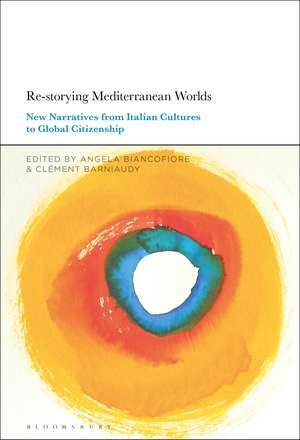Re-storying Mediterranean Worlds: New Narratives from Italian Cultures to Global Citizenship
Editat de Professor or Dr. Angela Biancofiore, Dr. Clément Barniaudyen Limba Engleză Paperback – 19 apr 2023
| Toate formatele și edițiile | Preț | Express |
|---|---|---|
| Paperback (1) | 190.75 lei 43-57 zile | |
| Bloomsbury Publishing – 19 apr 2023 | 190.75 lei 43-57 zile | |
| Hardback (1) | 447.01 lei 22-36 zile | +26.15 lei 5-11 zile |
| Bloomsbury Publishing – 6 oct 2021 | 447.01 lei 22-36 zile | +26.15 lei 5-11 zile |
Preț: 190.75 lei
Preț vechi: 249.05 lei
-23% Nou
Puncte Express: 286
Preț estimativ în valută:
36.50€ • 38.21$ • 30.38£
36.50€ • 38.21$ • 30.38£
Carte tipărită la comandă
Livrare economică 31 martie-14 aprilie
Preluare comenzi: 021 569.72.76
Specificații
ISBN-13: 9781501378973
ISBN-10: 150137897X
Pagini: 232
Dimensiuni: 152 x 229 x 25 mm
Greutate: 0.31 kg
Editura: Bloomsbury Publishing
Colecția Bloomsbury Academic
Locul publicării:New York, United States
ISBN-10: 150137897X
Pagini: 232
Dimensiuni: 152 x 229 x 25 mm
Greutate: 0.31 kg
Editura: Bloomsbury Publishing
Colecția Bloomsbury Academic
Locul publicării:New York, United States
Notă biografică
Angela Biancofiore is Professor of Italian Studies at Paul Valéry University-Montpellier, France. She has published several books on Italian studies and Mediterranean literature and arts, including Pasolini, Palermo, Palumbo (2003), awarded with the 2006 international "G. Sormani" prize, and Soyons le changement. Nouvelles tendances dans la littérature italienne contemporaine. Une anthologie (2016).Clément Barniaudy is Associate Professor of Geography at University of Montpellier, France, and a member of the research center LIRDEF (Laboratoire Interdisciplinaire de recherche en Didactique, Education et Formation). He co-founded the center for Theories and Practices of Care, and co-led the research project, "Econarrative: Ecological Narratives as a factor of Resilience and Caring" (2020).
Cuprins
List of FiguresNotes on ContributorsAcknowledgementsIntroduction: Thinking Interconnected Worlds Angela Biancofiore (Paul-Valéry University-Montpellier, France) & Clément Barniaudy (University of Montpellier, France)1. Mediterranean Worlds: Towards an Ecology of CreationAngela Biancofiore (Paul-Valéry University-Montpellier, France)2. An Impossible Abode: The World and Modernity Myriam Carminati (Paul-Valéry University-Montpellier, France)3. Literary Sardness: Between Colonialism and Postcolonialism, Creoleness and CreolizationMargherita Marras (University of Avignon, France)4. From House to Archipelago: Ways of Inhabiting Mediterranean WorldsClément Barniaudy (University of Montpellier, France)5. Pasolini and the Mediterranean: Lost Cultural Worlds and the Reappearance of Archaic WorldsMatthias Quemener (Helsinki French College, Finland)6. The Mediterranean Panorama through Migrant WritersVittorio Valentino (Manouba University, Tunisia)7. The Other Mediterranean: Italian Migration PoetryFlaviano Pisanelli (Paul-Valéry University-Montpellier, France)8. Naples and Europe, Past and Future: The Sud Review - A Link between the Mediterranean and EuropeCathryn Baril (Paul-Valéry University-Montpellier, France)9. The Mediterranean Town in QuestionRaffaele Cattedra (University of Cagliari, Italy)10. Testimony: Where Is Tunisia Going?Fethi Nagga (University of Tunis, Tunisia)11. Trilingualism in Tunisia: A Disturbing TopicAlfonso Campisi (University of Tunis, Tunisia)12. The Charter of Palermo: The Future of a UtopiaJean Duflot (Independent Journalist, France)Appendix: The Charter of PalermoSubject IndexNames Index
Recenzii
The Mediterranean has always been the sea of all possibilities and all dramas. This volume is presented 'as a ship navigating the waters of the Mediterranean', offering stopovers along the coasts most of which are located in France, Tunisia and above all in Italy, which is at the epicenter of this re-storying of Mediterranean worlds. During this navigation, we learn more about the planet, of which this sea - at the crossroads of three continents - is one of the most accomplished syntheses, and about the dimensions of our humanity. A great book, definitely.
The Mediterraneanis not only a place on maps. It is a category, indicating crossings, hybridizations, the multiple Souths of people and natures that lands and seas connect as well as divide. With its rich ensemble of voices and motives, Re-storying Mediterranean Worlds: New Narratives from Italian Cultures to Global Citizenship explores the cultural and political layers of this category, transforming the Mediterranean into an open frontier for global encounters and visions.
The most recent rhetoric on the Mediterranean has tended to define it as a porous barrier to be reinforced as a means of exclusion. In contrast, the present collection untangles, refocuses and retells the intricate confluence of stories and histories that commonly touch all its shores.
Challenging Eurocentrism from within its borders, scholars of different disciplines, generations and national belonging investigate the Mediterranean as a site of resistance, while privileging its margins and internal fractures. In addition to the specificity of each case study, Re-storying Mediterranean Worlds invites us to theorize societies and cultures beyond national borders and to rethink both the North vs South and East and West divide. It also reminds us that de-centring and re-centring the observer's gaze are necessary practices in our approach to the world.
The Mediterraneanis not only a place on maps. It is a category, indicating crossings, hybridizations, the multiple Souths of people and natures that lands and seas connect as well as divide. With its rich ensemble of voices and motives, Re-storying Mediterranean Worlds: New Narratives from Italian Cultures to Global Citizenship explores the cultural and political layers of this category, transforming the Mediterranean into an open frontier for global encounters and visions.
The most recent rhetoric on the Mediterranean has tended to define it as a porous barrier to be reinforced as a means of exclusion. In contrast, the present collection untangles, refocuses and retells the intricate confluence of stories and histories that commonly touch all its shores.
Challenging Eurocentrism from within its borders, scholars of different disciplines, generations and national belonging investigate the Mediterranean as a site of resistance, while privileging its margins and internal fractures. In addition to the specificity of each case study, Re-storying Mediterranean Worlds invites us to theorize societies and cultures beyond national borders and to rethink both the North vs South and East and West divide. It also reminds us that de-centring and re-centring the observer's gaze are necessary practices in our approach to the world.
